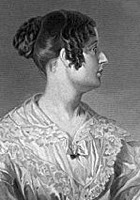A Spirit's Return Comments
Thy voice prevails - dear friend, my gentle friend!
This long-shut heart for thee shall be unsealed,
And though thy soft eye mournfully will bend
...
Read full text
FOURTEENTH: nationality overcome this fear. She saw all of the fighting as useless bloodshed and a waste of human life. "England and Spain" was used by her to spread her message across Europe, that the wars were senseless and that peace should resume.
THIRTEENTH: isles of Great Britain." For this thy noble sons have spread alarms, And bade the zones resound with BRITAIN's arms! "It is seen throughout this poem that Felicia Hemans is alarmed with the thought of war but her overall pride of
TWELTH: The poem called for an end of the tyranny of Napoleon Bonaparte and for a long lasting peace after the war. The poem is very patriotic towards Great Britain as seen in Heman's multiple references to "Albion" which is an older name for the
ELEVENTH: England and Spain, or, Valor and PatriotismHer second book, England and Spain, or, Valor and Patriotism, was published in 1808 and was a narrative poem honoring her brother and his military service in the Peninsular War.
TENTH: regarded by contemporaries such as Wordsworth, and with a popular following in the United States and the United Kingdom of Great Britain and Ireland. When she died of dropsy, Wordsworth and Walter Savage Landor composed memorial verses in her honour.
NINTH: were immensely popular, especially with female readers. Her last books, sacred and profane, are the substantive Scenes and Hymns of Life and National Lyrics, and Songs for Music. She was by now a well-known literary figure, highly
EIGHT: .Later lifeFrom 1831 onwards, she lived in Dublin, where her younger brother had settled, and her poetic output continued. Her major collections, including The Forest Sanctuary (1825) , Records of Woman and Songs of the Affections (1830) were
SEVENTH: of poetry being published by the respected firm of John Murray in the period after 1816, beginning with 'The Restoration of the works of art to Italy' (1816) and 'Modern Greece' (1817) . 'Tales and historic scenes' was the collection which came out in 1819, the year of their separation.
SIXTH: During their first six years of marriage, Felicia gave birth to five sons, including Charles Isidore Hemans, and then the couple separated. Marriage had not, however, prevented her from continuing her literary career, with several volumes
FIFTH: The poetess has written many many books whch hve become world-famous, her name we can find on any anthology spread world wide. Though she had 5 boys, her literary work was still blooming till her death
FOURTH: I was shocked when I read that she was married and within 6 years she gave birth to 5 sons-babies, and her poetry work was still busiest during her life
THREE: It looks like if she was hidden from the public, but her poems are taught and used in many schools and others, she was/is well known also in the USA
TWO: Thie poetess is as well-known and world famous as William Shakespeare, William Wordsworth and my other world famous poems, ONLY we have not read many of her poems
A true epic poem if we look at the length of this poem, opens with a direct address from the narrator to her lover; the first two stanzas of the poem express the narrator's desire...Firt 5 Stars Full Score
the power whose conquering anguish stirred the tomb Great expression. Thanks for sharing it here.
Our weary thirst of soul? Cold, weak and cold, Is earth's vain language, piercing not one fold Of our deep being! Oh, for gifts more high! For a seer's glance to rend mortality! ........................................ Yet such a long run riding on language formed by words! Here is the beauty of poetic art. Thanks for posting.
Strange wandering sound! Thanks for sharing this poem with us.

Well articuated and nicely embellished with poetic rhyme and rhythm